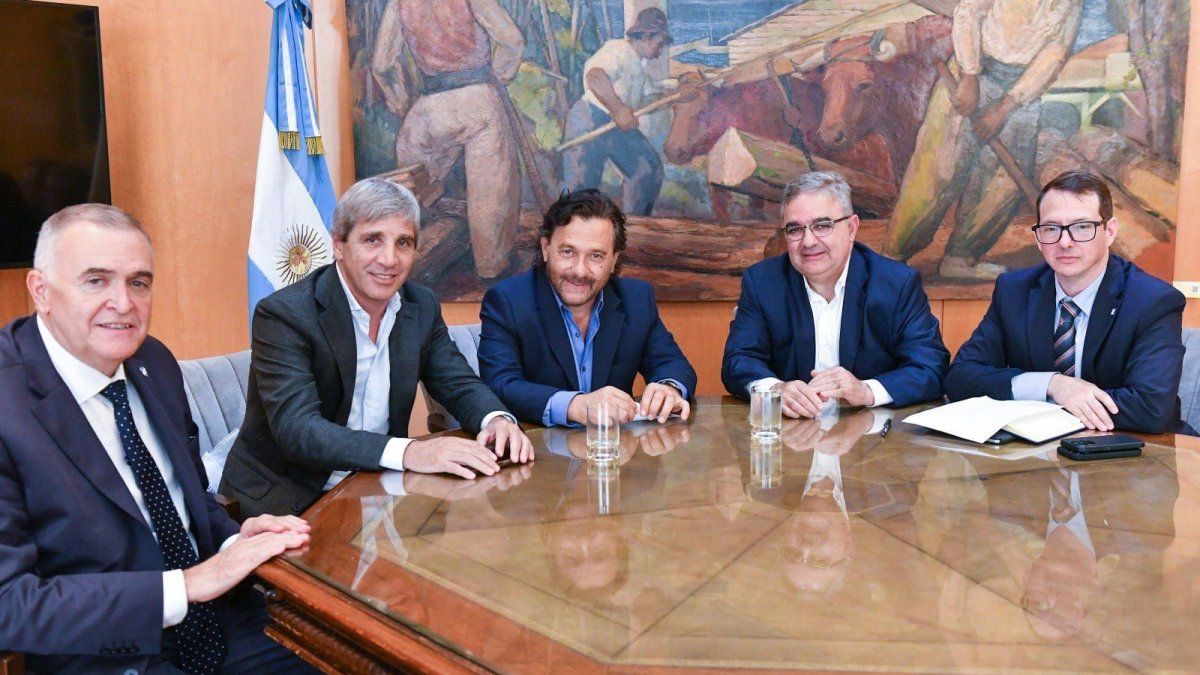Governors of different political groups began to move for what they consider the last opportunity of the year to extract funds for works from the Government and is the treatment in Congress of the 2025 Budget. Osvaldo Jaldo from Tucuman, Gustavo Sáenz from Salta and Raúl Jalil from Catamarca are in Buenos Aires with that objective, while six leaders will crystallize in the next few hours the birth of the Coastal Region. The doubt at this time, a source confided to Ámbito, is knowing how far President Javier Milei would be willing to make his warning of “governing without a Budget” come true.
Jaldo, Sáenz and Jalil met with the Minister of Economy, Luis Caputoand with the Secretary of the Treasury, Carlos Guberman. It turned out that the three addressed issues related to the Budget and the management of a series of benefits for local economies.
It is deduced that in the battery of complaints from the provinces to the Casa Rosada, after the approval of the Bases Law and the photo of the May Pact in Tucumánobjectives that the Government achieved with the unfulfilled promise of fresh funds, the governors will note the meager turnover of items for health, transportation and education, the insufficient resources for public works (which include unpaid debts from the previous administration), plus the delay in the millions that correspond to them for the retirement funds.
Embed – https://publish.twitter.com/oembed?url=https://twitter.com/LuisCaputoAR/status/1846233938177806710&partner=&hide_thread=false
In recent days it was learned that the Budget project submitted by the Executive Branch to Congress represents a drop of US$5,000 million for local governments, according to a report by the Encuentro Foundation, based on official data. This loss would be due to the elimination of three specific allocations that imply a resignation of resources for the provinces of $6 billion. The assignments that the Casa Rosada would seek to suppress are those of the 11% VAT; the fuel tax funds and trusts and the tax component of the Monotributo that is assigned to Social Security. And taking the exchange rate of the Budget as of December 2025, the reduction would be equivalent to about US$5,000 million, the report highlighted. That is, a pothole for the governorships that is almost impossible to replace with their own funds.
A sign that some leaders have begun to be cautious in the relationship with Balcarce 50 was what happened in the session in which the presidential veto of the university financing law was firm. Marcelo Orrego, from San Juanmanaged to get the deputies who respond to him to vote against – before they always accompanied the Government -; while the salteño Sáenz He made two of the three parliamentarians who accompany him also speak out against the controversial veto. It is not the case of Tucumán Jaldowho guaranteed the Executive Branch the three votes of the Independence Block. Raúl Jalil managed to get the deputy Fernanda Ávila (UP) of the premises – despite the fact that it was in the building – depriving the opposition of a key vote, which made it easier for the Government’s will to be imposed. The day after the session Jalil was received at the Casa Rosada by Lisandro Catalán, deputy chief of staffbut secrecy was maintained regarding the content of the meeting.
Although some governors played hard with the Government, under the justification of defending local interests, that was not enough to receive funds with which they could be satisfied with paying a high political cost. According to a report from Argentine Institute of Fiscal Analysis (Iaraf)the friendly provincial leaders did obtain extra aid to date -Misiones, $9,000 million; Chubut, $4.5 billion; Entre Ríos, $3.8 billion; Santa Cruz, $3,000 million and Tucumán, $2,000 million; but the flip side is that non-automatic transfers from the Nation to the provinces had a real drop of 67.5%. That is, it was all loss.
Embed – https://publish.twitter.com/oembed?url=https://twitter.com/FencuentroAR/status/1844010894252282334&partner=&hide_thread=false
This scenario was even warned by the dialogue expert Jaldo himself a few days ago when he admitted, in conversations with various media, that he hopes that the works that the Nation signed with the provincial leaders will be carried out through this Budget route. “We have permanent contact with the Casa Rosada for the Budget 2025 because in the forms that were raised there were not the works that we had signed with the Government,” he said. “These are works in which the Nation contributed 70% of the financing and the province 30% (…) We intend that The attached forms that are going to be discussed in Congress coincide with the minutes that we signed in the Casa Rosada, which detail the funds with which the works will be financed,” he explained.
A source linked to a northern provincial chief confided to this medium that the concern at this time is to know if the Government House will be inclined to reach agreements with the provincial chiefs or if, if not reached, President Javier Milei would comply with his warning to “not worry about governing without a Budget.” According to this official, the absence of this law would allow the Head of State to manage the allocations for the governors with greater discretion.
Source: Ambito
I am a 24-year-old writer and journalist who has been working in the news industry for the past two years. I write primarily about market news, so if you’re looking for insights into what’s going on in the stock market or economic indicators, you’ve come to the right place. I also dabble in writing articles on lifestyle trends and pop culture news.




